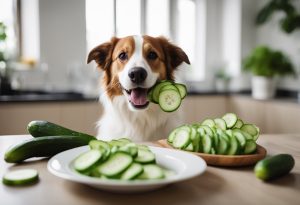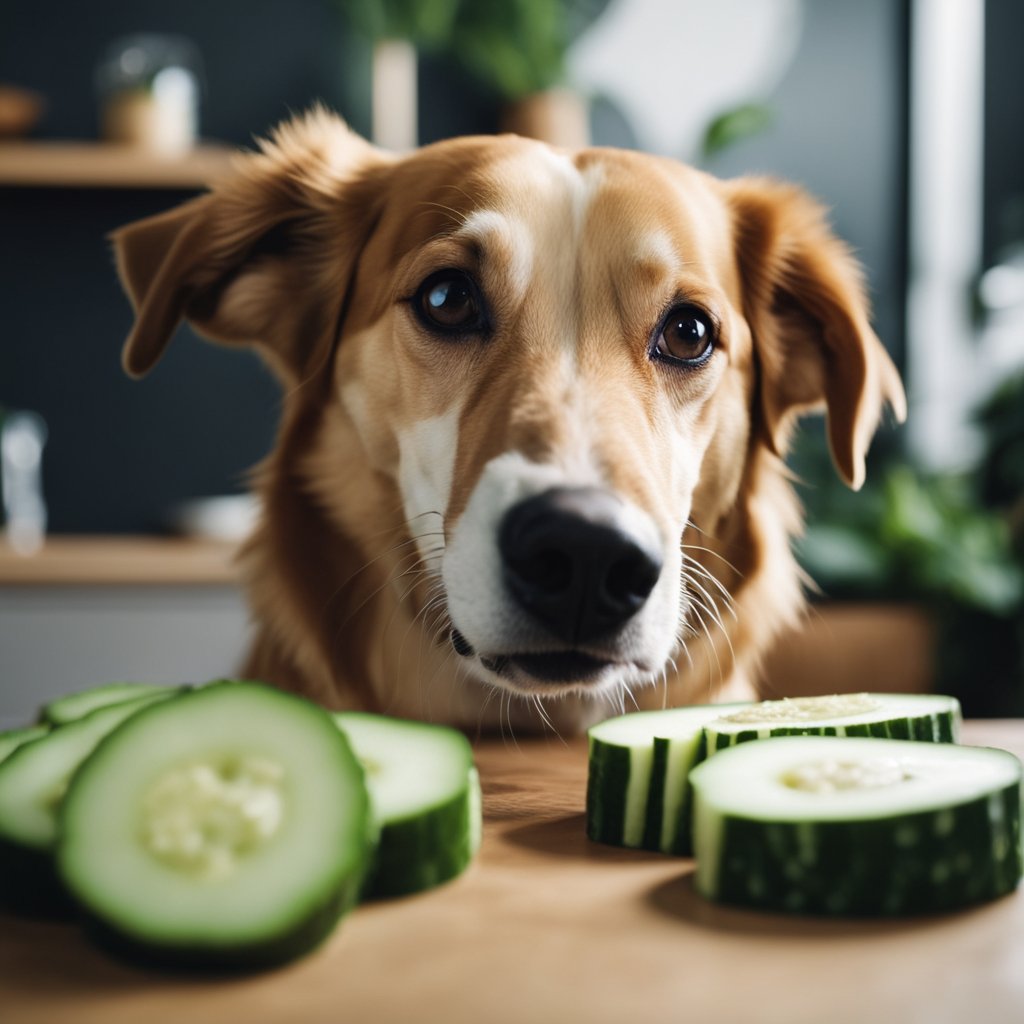Can Dogs Eat Cucumbers? Understanding the Benefits and Risks
Cucumbers are a popular snack for many, but you might wonder if they are safe for your dog. The good news is that cucumbers are safe and healthy for dogs when given in moderation. They are low in calories and packed with vitamins, making them a great occasional treat for your furry friend. By incorporating cucumbers into your dog’s diet, you can provide a refreshing and nutritious option.

It’s important to know how to offer cucumbers safely and what to watch out for. While most dogs can enjoy cucumbers, there are a few guidelines to keep in mind. Understanding these details will help you make the best choices for your dog’s health and happiness.
Key Takeaways
- Cucumbers can be a healthy snack for your dog.
- Moderation is key to avoiding digestive issues.
- Always prepare cucumbers correctly before offering them.
Canine Nutritional Needs

Understanding what your dog needs in their diet is key to keeping them healthy. Dogs require specific nutrients to support their overall well-being, and certain foods can help meet these needs.
Essential Nutrients for Dogs
Your dog needs a variety of essential nutrients for growth, maintenance, and energy. The main nutrients include:
- Proteins: Vital for muscle development and repair. Good sources are meat, fish, and eggs.
- Fats: Important for energy and healthy skin. Look for omega-3 and omega-6 fatty acids in fish oil and flaxseed.
- Carbohydrates: Provide energy and help with digestion. Sources include whole grains and vegetables.
- Vitamins and Minerals: Support various bodily functions. Supplement your dog’s diet with fresh fruits and vegetables, which offer important vitamins like A, D, and E.
A balanced diet should combine these nutrients to keep your dog healthy and thriving.
Hydration and Vegetables
Fresh water is essential for your dog’s health. Staying hydrated aids in digestion, nutrient absorption, and temperature regulation. You should always provide clean water for your dog.
Many vegetables, like cucumbers, are high in water content and can help with hydration. Foods like carrots and green beans also offer hydration while supplying fiber and nutrients. When adding vegetables to your dog’s diet, do it gradually and monitor for any digestive issues. Limit starchy vegetables, which can lead to weight gain, and focus on low-calorie options. Keeping your dog hydrated and well-nourished is crucial for their overall health and well-being.
Cucumbers and Dogs

Cucumbers can be a healthy and refreshing treat for your dog. They are low in calories and provide several benefits when given in moderation. However, it’s important to consider the right serving size and potential risks involved.
Benefits of Cucumbers for Dogs
Cucumbers are rich in water, making them a great way to keep your dog hydrated. About 96% of a cucumber is water, which can be especially helpful on hot days.
These vegetables are also low in calories, containing only about 8 calories per half-cup. This makes cucumbers a tasty alternative to high-calorie treats.
Additionally, cucumbers provide certain vitamins and minerals, such as vitamin K and potassium. These nutrients can support your dog’s overall health, promoting strong bones and healthy blood pressure.
Serving Size and Frequency
When introducing cucumbers to your dog’s diet, moderation is key. A good starting point is to offer a few small slices. You can adjust based on your dog’s size and tolerance.
For most dogs, a few cucumber slices a few times per week is enough. If your dog has never had cucumbers before, monitor their reaction after the first serving to check for any digestive issues.
Always remove the skin if your dog has a sensitive stomach, as it may be harder for them to digest. Make sure to cut cucumbers into small, manageable pieces to prevent choking.
Potential Risks
While cucumbers are generally safe, some dogs may not enjoy them. If your dog seems disinterested, don’t force them to eat them.
Feeding too many cucumbers can lead to digestive issues, such as gas or diarrhea. Watch for any signs of discomfort after eating.
Lastly, ensure you wash cucumbers thoroughly to remove any pesticides or chemicals. Always consult your vet if you have concerns about adding new foods to your dog’s diet.
Resources

If you’re interested in learning more about whether dogs can eat cucumbers, here are some helpful resources:
- The American Kennel Club offers insights on the safety and health benefits of cucumbers for dogs. You can read more here.
- For a detailed look at various fruits and vegetables suitable for dogs, check the American Kennel Club’s guide here.
- The Dodo has a vet’s perspective on cucumbers as a treat for dogs, highlighting their hydration benefits. Find that information here.
- Canine Journal discusses moderation when feeding cucumbers to your pet. Learn more about healthy snacks for dogs here.
- Rover provides useful tips on what dogs can safely eat, including cautions against pickled cucumbers. Read more about healthy treats here.
These resources will help you make informed choices about your dog’s diet.
Frequently Asked Questions

You might have some questions about feeding cucumbers to your dog. Here are answers to common concerns regarding cucumber skin, seeds, and more.
Is cucumber skin safe for dogs to eat?
Yes, cucumber skin is generally safe for dogs. However, you should wash it thoroughly to remove any pesticides or contaminants. If your dog has a sensitive stomach, it’s best to peel the cucumber first.
Are tomatoes also good for dogs, similar to cucumbers?
Tomatoes can be fed to dogs in moderation, but they are not as safe as cucumbers. Ripe tomatoes are safer, while green tomatoes and tomato leaves contain solanine, which can be harmful. Always consult with your vet before adding new foods to your dog’s diet.
Should dogs avoid cucumber seeds, or are they safe?
Cucumber seeds are safe for dogs to eat. They are not toxic and are often included when feeding your dog cucumber slices. Just be sure to monitor your dog for any signs of digestive upset.
What is the difference between feeding dogs raw versus cooked cucumbers?
Raw cucumbers are the preferred option for dogs due to their high water content and crunchiness. Cooking can reduce some nutrients and make them softer, which may not be as enjoyable for your dog. Raw cucumbers also add more hydration.
How often can dogs safely consume cucumbers?
Dogs can safely enjoy cucumbers in moderation as an occasional treat. A few slices now and then are fine, but avoid feeding them large quantities. Always observe your dog for any reactions when trying new foods.
What other vegetables are recommended for dogs?
Other good vegetables for dogs include carrots, green beans, and sweet potatoes. These options are nutritious and generally safe when fed in moderation. Always check with your vet before introducing new foods to your dog’s diet.

